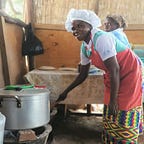Cooking with Gas: Efficient and Affordable
With MCHF support, 265 Energy is improving the accessibility and affordability of liquefied petroleum gas (LPG) in Malawi
For Kenneth Chikwambala, cooking and charcoal were once synonymous. He grew up watching his mother cook over a small charcoal stove to feed her family. When he moved out on his own, he also cooked on a charcoal stove. Nowadays, Kenneth simply does not have time to cook with charcoal. He runs his own printing business and studies communications at the university. Like many young professionals who work and study, time is a valuable asset.
“When you cook with charcoal, you are always waiting. You have to wait for the charcoal to catch the fire, and then wait for the fire to get hot before you can start cooking,” he says.
The art of cooking a meal changed when he responded to a Whatsapp message about the Switch2Gas campaign in Lilongwe. The message originated from the company 265 Energy, or 265E, a distributor of liquefied petroleum gas (LPG), and offered consumers a new, three kilogram gas cylinder, with gas and with a single stove top that fastens directly to the top of the cylinder.
The campaign is the brainchild of Mfundo Mvundula, the CEO of 265E. Historically, Malawian consumers have ignored using LPG for cooking for two reasons: the high up-front costs associated with purchasing an LPG cooker, and the commonly held fear that cooking with gas is dangerous.
With support from the USAID and UKaid co-funded Modern Cooking for Healthy Forests program (MCHF), Mvundula and 265E are addressing these misconceptions and changing how food is cooked in Malawi’s cities. With a grant from MCHF, the company has introduced a smaller, more affordable, portable gas cylinder to Malawi’s marketplace. The Switch2Gas campaign has sold more than 1,800 cylinders in the first three months of the campaign.
Kenneth understood the benefits right away and purchased the small gas cylinder for his kitchen. “It is a wise choice. Gas is instant and saves me time and money. Cooking is easy and I can do other things with my spare time,” he says.
Saving Time, Saving Forests
Kenneth is joining a growing number of Malawians who are tired of cooking with charcoal and eager for alternatives. In Malawi’s urban areas, more than 75% of urban households rely on illegally sourced charcoal as their primary cooking fuel.
It’s not just wasted time. Malawi’s dependence on charcoal is driving deforestation and degradation. The majority of charcoal is sourced from Malawi’s dwindling forest reserves. MCHF partners with dozens of small and medium enterprises like 265E to increase the supply of cleaner cooking energies and technologies in order to decrease the demand for illegal charcoal.
“Within the first few weeks of launch, it was clear that the demand for gas was high, and many Malawians were eager to switch to a safer and cleaner cooking option,” says Mvundula. “Using gas requires some cash flow, but at least we can make it affordable.”
The 265E starter kit, which includes the small cylinder and a single burner cookstove, is priced at just 35,000 kwacha ($35), compared to the 6 kg cylinder starter kit which costs 105,000 kwacha ($105). At an affordable price, the smaller kit removes the main barriers to entry for many consumers.
“Our market studies found that if the price is under 50,000 kwacha, Malawians will go for it,” he explains. The 3 kg cylinder of LPG lasts up to two weeks and costs around 7,000 kwacha to refill.
With the performance-based grant from MCHF, 265E plans to sell more than 5,300 cylinders to households in Blantyre, Lilongwe, Mzuzu, and Zomba. Over the next 12 months, 256E expects to sell an additional 3,000 starter kits.
To improve accessibility, 265E has located access points closer to end users and is expanding its door-to-door delivery service. In addition, the company has introduced a mobile money payment system. Non-cash payment models allow customers to keep their routines, and a 265E van brings gas directly to their doorstep.
The company is also leading awareness raising campaigns to promote the benefits of using LPG. Each 3 kg cylinder is safety-certified by AFROX Malawi, giving consumers confidence in the product.
“Culturally, we have to convince people that this is safe,” says Mvundula. “Many people believe their food won’t taste the same if they cook with gas. These are the ideas that we are trying to demystify.”
Thanks to early success and MCHF support, 265E has secured additional financing of $220,000 in loans with favorable terms from two banks. This financing allows the company to expand operations and reach more consumers in more cities.
“Growth in LPG use is spiking. We need to use this moment to carry out sensitization campaigns to raise awareness and change the perception that using gas for cooking is dangerous,” says Macjessie Muula, Gas Specialist at the Malawi Energy Regulatory Authority (MERA).
MCHF continues to partner with the government to improve and align forestry and energy policies to promote legal alternative energy sources like LPG, biogas, and sustainably produced biomass energies, such as pellets. MCHF is also partnering with efficient cook stoves suppliers and manufacturers.
